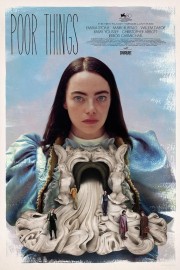Poor Things
I’ll be honest- there was a stretch in “Poor Things” where it just wasn’t working for me. It was straightforward enough of an idea to follow, but the execution just was a struggle to deal with. I’ve been hot-and-cold on Yorgos Lanthimos’s work over the years, and the basic bones of this story (taken from the novel by Alasdair Gray) just weren’t connecting with me. And then, Bella Baxter, Emma Stone’s character, started to show some real agency, and I was on board with the film. I’m still not sure if I’ll ever vibe with Lanthimos’s work entirely, but there’s certainly something in his recent work I’m responding to. Or maybe it’s because Emma Stone is just incapable of not being appealing.
When the story starts, we see a character played by Stone dive into the river off of a bridge. It is the inciting moment of the entire film, but we will not understand its context until later. We next see her as Bella Baxter, whose movements are stiff, and whose vocabulary is that of a child. She is looked after by the hideous-looking Dr. Godwin Baxter (Willem Dafoe), who himself looks like Frankenstein’s monster. One day, during a class he is teaching, he enlists the help of a student, Max (Ramy Youssef), to chart Bella’s progress in becoming a developed adult. He is transfixed by her, and would like to marry her. Before that can happen, however, a lawyer (Mark Ruffalo) seduces Bella to run away with him, and she is out in the world. As she discovers herself in the world, the truth behind that opening scene reveals itself, and we see which men truly care for Bella, and which see her simply as a means of sexual release.
The Frankenstein reference regarding Godwin is very intentional on my part; the film’s story is very much riffing on Mary Shelley’s iconic monster story, but the screenplay by Tony McNamara has a fundamental conceit at its heart that repelled me at first. Early on, we see Bella discover masturbation, an implication that she is ready to mature sexually. But she still has the brain of a child- as Godwin starts to discuss the idea of her being taken sexually, and we see where things go with Duncan (Ruffalo’s character), it’s a bit off-putting, and I wasn’t sure if this movie was going to work for me. The film’s center is about Bella’s sexual awakening, and how her desires lead to a desire of independence, but the way it gets there is a bit rough, and it’s understandable why some people wouldn’t connect with the film. This is where Stone being the lead is crucial. She makes us empathize with this character so much as she starts to grow into a woman before our eyes. When we first see them, none of the men in this film are really doing the right thing- Godwin’s experiment is grotesque, we cannot tell whether Max’s feelings are because she feels like a child but looks like a woman, Duncan’s desires are always among the basest for Bella, and when we meet Alfie (Christopher Abbott) later, his are not the emotions of someone who has “missed” his wife at all. What I like is that it becomes obvious as the film continues which men are worth empathizing for and which are not, which ones truly want to control Bella and which ones want what’s best for her. Even in the end, I’m not sure whether any of the men are truly redeemed, but those whom love Bella would rather see her be herself than be under the yolk of the wrong person.
The turnaround I had with this film as I watched it is a rare one- usually, if a movie turns me off early it’s going to be a slog. But Lanthimos orchestrates this world, and story, beautifully. All of the main performers are excellent- in addition to Stone, I love Dafoe’s ability to get us to care about his own monster, and Ruffalo is hilariously vulgar and controlling. The cinematography, the production design, and the costumes are all delectable; I’ll admit that Jerskin’s Fendrix’s score didn’t entirely land with me, but it does have some moments where it just lands emotionally and musically. I completely understand if this ends up not being someone’s cup of tea, but if they give it another chance, I wonder if they would have the same turnaround on it that I did. “Poor Things” is a very special story that I came to embrace.










